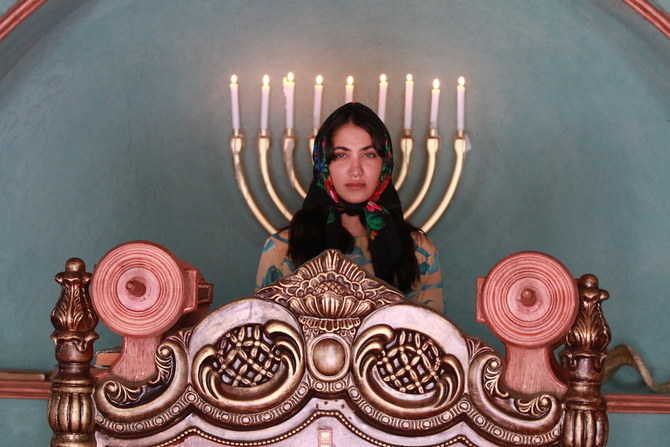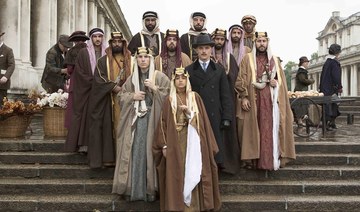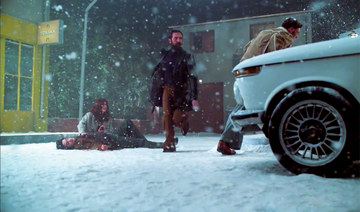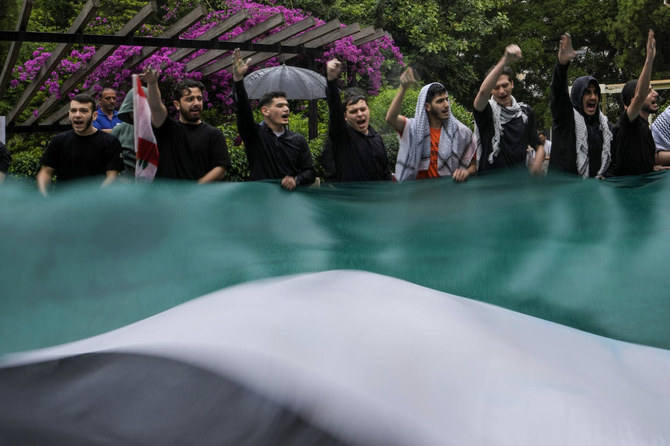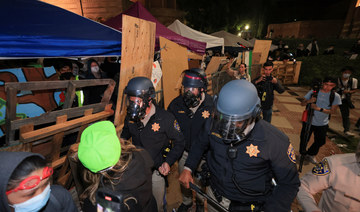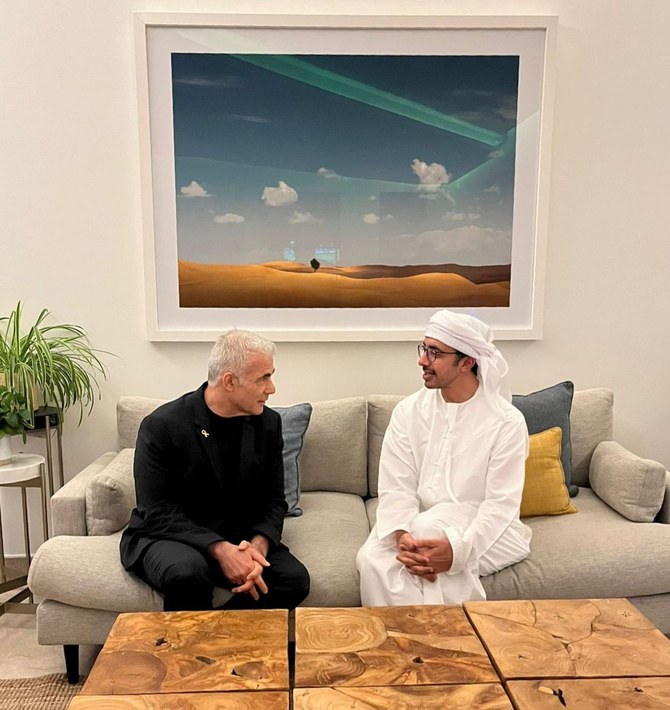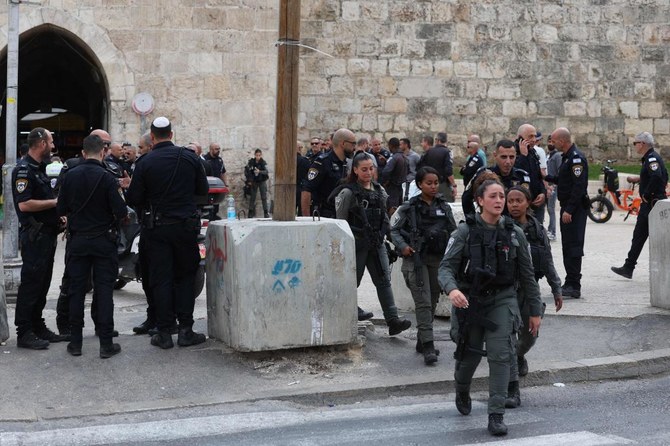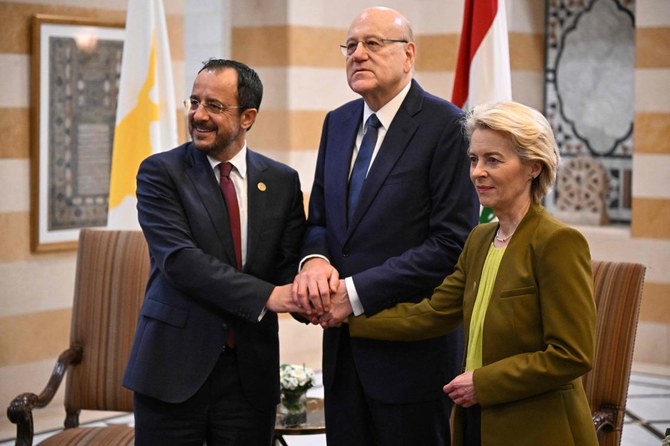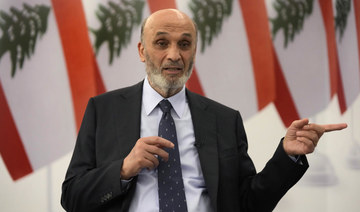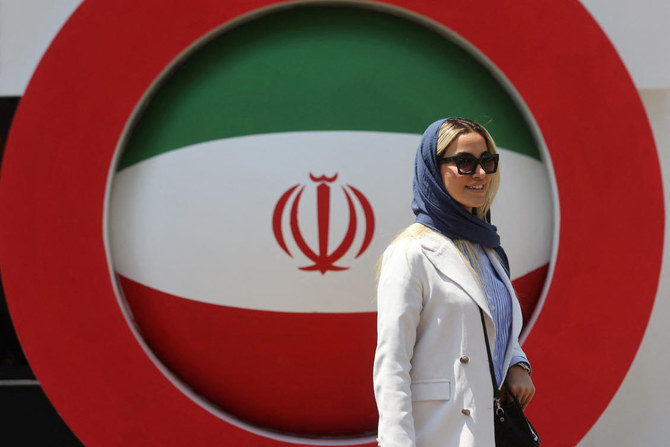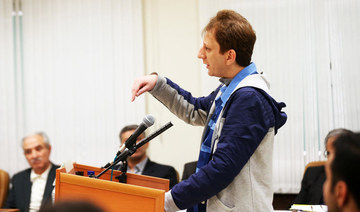LONDON: If the very best drama seeks not only to entertain but also to educate and provoke debate on the pressing issues of the day, then MBC’s hit Ramadan series “Um Haroun” must surely be in the running for multiple awards.
Before even a single episode had aired, controversy had flared over the series, in which a central character is a Jewish nurse living in harmony with her Arab neighbors in 1940s Kuwait.
A spokesperson for the Palestinian Hamas group told Reuters that portraying Jewish people in a sympathetic light was “cultural aggression and brainwashing,” while a group of organizations opposed to normalizing ties with the state of Israel took to social media to urge viewers to boycott what it condemned as the “wicked drama.”
The program-makers insist that, while “Um Haroun” promotes themes of tolerance and coexistence, it is nevertheless a work of fiction and not a docudrama. Yet it is no coincidence that the series is set in the early 1940s, a time when Jews and Arabs lived in harmony throughout the Gulf states.
In fact, main character Um Haroun, after whom the series takes its name, is loosely based on real-life Jewish midwife Um Jan, who moved to Bahrain from Iraq in the 1930s, a time when Arabs, Jews and Christians lived and worked together throughout the region.
All that changed, however, on November 29, 1947, with the passing of UN Resolution 181, which called for the partition of the British-ruled Palestine into an Arab and a Jewish state and envisaged Jerusalem as a “corpus separatum,” under a special international regime to be administered by the UN.
Thirty-three countries voted in favor of the resolution but, unsurprisingly, not a single Arab state did so. Egypt, Iraq, Lebanon, Saudi Arabia, Syria and Yemen were among the 13 nations that voted against it.
The outcome, compounded on May 14 the following year with the foundation of the state of Israel, undid centuries of peaceful Arab-Jewish relations. The day after the UN vote, Palestine erupted in civil war. On May 15, 1948, a coalition of Arab forces invaded Palestine.
In the Arab world the consequences of what followed — Al-Nakba, or the “Catastrophe,” in which three-quarters of a million Arabs were driven from their homes in Palestine — have never been forgotten.
Less well known, however, is the fate of a similar number of Jews who after 1948 were either driven out or who chose to migrate from the Arab countries they had once called home, in many cases leaving behind all of their property.
One of those refugees was 16-year-old Ada Aharoni, an Egyptian-born Jew of French descent whose father, a flour merchant in Cairo, had his business and assets seized by the Egyptian government in 1949. The family fled first to France and then to Israel.
Aharoni grew up to be a writer, sociologist and peace campaigner, credited with coining the phrase “the second exodus” to describe the forced migration of Jews from Arab countries after 1948.
In her work, however, her purpose has always been to seek a resolution between Jews and Arabs through mutual understanding.
The motivation of a paper she published in the journal Peace Review in 2010, she wrote, was to “placate both the Palestinians and the Jewish refugees from the Arab countries by pointing out that their sufferings, problems and feelings of victimization have many common points, and that both sides share them.”
Before and after the rise of Islam in the Middle East, Jews had “enjoyed well-being and a degree of tolerance and protection under the law and in some instances even rose to prominence under Arab rule.”
This harmonious state of affairs came to an abrupt end in 1948, to be replaced by “intolerance, discrimination, degrading civil codes and often cruel persecutions which were meted out to members of the Jewish faith by their host countries.”
Until the foundation of Israel in 1948, there were an esimated 800,000 Jews living throughout the Arab world in the Middle East and North Africa.
According to regional censuses, by 1976 most of these communities had all but disappeared. Between 1948 and 1976 the Jewish population in Egypt fell from 100,000 to about 200. Iraq’s Jewish population dwindled from over 130,000 to just 400.
“These historic facts,” Aharoni argued, “could be used to advance the peace process in the Middle East today if they are presented and used in a positive way.”
Now there is evidence of a positive change in the decades-old blanket rejection of Israel among Arab states and, while no one at MBC is claiming that “Um Haroun” is anything but dramatic fiction, there is little doubt that the program’s themes have caught the mood of change.
In 2019, the UAE declared the “Year of Tolerance,” appointing a senior member of the royal family as Minister of Tolerance and reinforcing its commitment to being “a bridge of communication between the people of the world and their various cultures in an environment of openness and respect that rejects extremism and promotes coexistence.”
That same year US rabbi Marc Schneier, president of the Foundation for Ethnic Understanding and special adviser to Bahrain’s King Hamad bin Isa Al-Khalifa, wrote an article for the Jerusalem Post celebrating the “blossoming of Jewish life in the Gulf as part of an overall positive trajectory of Israel-Gulf relations.”
It is, of course, no secret that while Bahrain has the only remaining indigenous Jewish population in the Gulf, for the past decade Dubai has been home to a synagogue serving the emirate’s small Jewish community.
Now, wrote Schneier, Gulf leaders are “very optimistic about the opportunities that will present themselves once they have diplomatic relations with Israel.”
Their desire to move that process forward is informed, he believes, in part by political realities — economic benefits and the fact that “both Israel and the Gulf are facing the common threat of Iran” — but are not exclusively pragmatic.
There is a “genuine interest from Gulf leaders in bringing together Muslims and Jews.”
There have been other recent signs that the mutual enmities created in 1948 may finally be running out of steam.
In February this year, Dr. Muhammad al-Issa, secretary-general of the Muslim World League, became the most senior Islamic figure to visit the Nazi Auschwitz-Birkenau death camp.
His historic visit — on the 75th anniversary of the camp’s liberation in 1945 — was followed by a tweet from the foreign minister of the UAE, declaring that “in memory of the Holocaust, we stand on the side of humanity against racism, hatred, and extremism.”
Such is the changing mood in the Gulf that “Um Haroun” has translated to the screen. The sentiment, however, has not attracted instant universal support, as a mix of angry and supportive posts on social media testified.
Mazen Hayek, MBC Group’s director of PR, stressed that the series was pure fiction and not a docudrama.
“We are not worried by controversy,” he added. “We look at it as a healthy debate about issues, conceptions and conflict, which is necessary for any society to advance.
“How can any society move forward and embark on advancement and gradual change if it does not debate preconceived ideas and concepts?”
The Middle East, he says, “has for the past three or four decades been stereotyped, been portrayed by hardliners, extremists and terrorist networks as a region of hatred, fear, atrocities and blood.
“This is the ugly face of the Middle East that has been projected, and we consider it a positive thing to be able to show the other face.
“If with this show we are showing how Middle East societies had, and still have, tolerance, cross-cultural dialogue and cross-religious coexistence, then that is positive and that is MBC being true to its mission.”
* * * * * * *
UM HAROUN’S MESSAGE AS EXPLAINED BY MBC
The MBC drama “Um Haroun” has topped the list of Ramadan series for 2020 for two main reasons: its depiction of a time before sectarianism and its controversial nature.
Set in 1940s Kuwait, the show’s main message is coexistence in a village where tolerance, moderation and openness is the norm.
Written by Ali and Mohammed Shams and directed by Mohamed El Adl, “Um Haroun” follows a series of fictional events in a community composed of Muslims, Christians and Jews, and tells the story of a greatly respected and admired Jewish physician.
The show’s all-Arab cast includes Kuwaiti actress Hayat Al-Fahad, Abdulmohsen Alnemr, Fatima Al-Safi, Rawan Mahdi and Ahmed Al-Jasmi among others.
Al-Fahad’s character Um Haroun, which translates to “mother of Haroun,” plays the role of a midwife and nurse who assists women in giving birth and helps others across the village with their problems, with no regard to religion or background.
Representing the true meaning of “loving one’s neighbor,” the show’s main character takes viewers back to a time when Jewish communities existed in the Gulf.
“This is a first in Gulf drama, and so it’s something quite different for our audiences and something interesting to explore,” Al-Fahad said.
“Umm Haroun possesses kindness, honesty, charisma and a genuine love for her people, which makes her easy to trust and a pillar of the community.”
The plot could not be more relevant in the time of the coronavirus disease pandemic, when people across the world are realizing the importance of community and collective well-being.
Much like the character of Um Haroun, millions of health workers are selflessly putting themselves on the line for the greater good, proving that humanity is stronger when united.
“Um Haroun” demonstrates the importance of differentiating between what drives politics and what should drive humanity.
Tolerance and hope are far more powerful than hate, fear and divisiveness.



